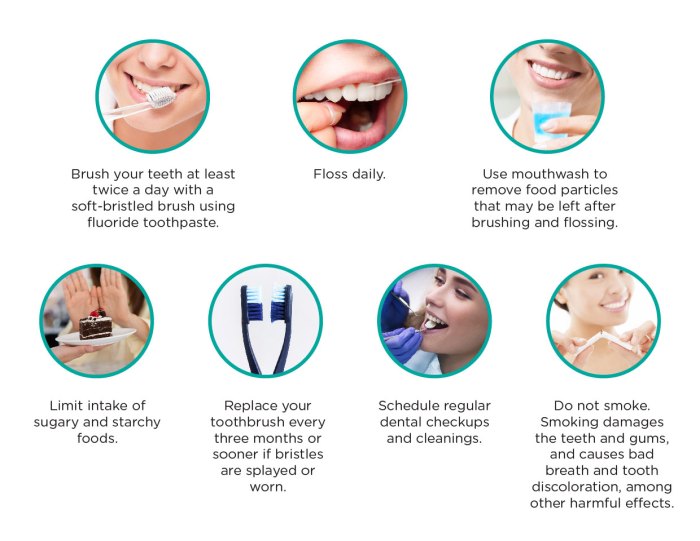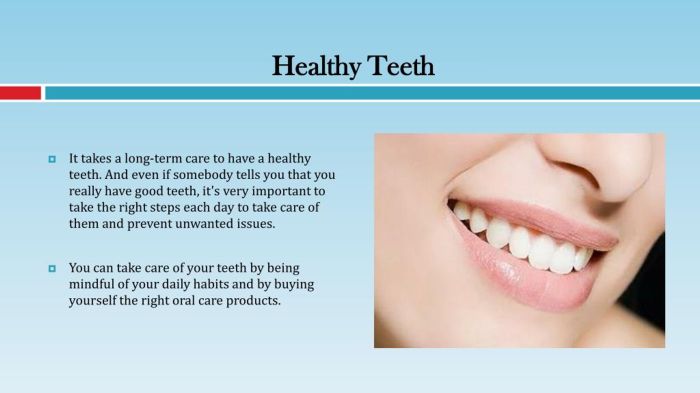
Best oral care practices for healthy teeth sets the stage for this enthralling narrative, offering readers a glimpse into a story that is rich in detail with entertaining interactive style and brimming with originality from the outset.
In this comprehensive guide, we will explore the essential steps to maintaining optimal oral health and achieving a radiant smile that shines bright like a diamond.
Importance of Oral Care
Maintaining good oral care practices is essential for ensuring healthy teeth and gums. Neglecting oral hygiene can lead to a host of dental problems that can impact not only your teeth but also your overall well-being.
Common Dental Issues
- Tooth Decay: Poor oral hygiene can result in the buildup of plaque, leading to cavities and decay.
- Gum Disease: Neglecting oral care can cause inflammation and infection of the gums, resulting in gum disease.
- Bad Breath: Bacteria in the mouth due to poor oral hygiene can lead to persistent bad breath.
- Tooth Loss: Untreated dental issues can eventually lead to tooth loss, affecting your ability to chew and speak properly.
Impact on Overall Well-being
Good oral health is not just about having a bright smile; it also plays a crucial role in your overall well-being. Poor oral hygiene has been linked to various systemic health issues, including:
- Heart Disease: Gum disease has been associated with an increased risk of heart disease and stroke.
- Diabetes: Individuals with gum disease may have difficulty controlling their blood sugar levels.
- Respiratory Infections: Poor oral health can lead to respiratory infections due to the inhalation of bacteria from the mouth.
- Pregnancy Complications: Gum disease has been linked to premature birth and low birth weight in newborns.
Best Practices for Brushing
Proper brushing technique is essential for maintaining healthy teeth and gums. It is recommended to brush your teeth at least twice a day, in the morning and before bed, for two minutes each time.
Correct Technique for Brushing Teeth
- Hold your toothbrush at a 45-degree angle to the gums.
- Use short, gentle strokes to brush the outer and inner surfaces of your teeth.
- Remember to brush the chewing surfaces and the back of your teeth as well.
- Don’t forget to brush your tongue to remove bacteria and freshen your breath.
How Often Should You Brush Your Teeth?
It is recommended to brush your teeth at least twice a day, in the morning and before bed, for two minutes each time. This helps remove plaque and food particles, preventing cavities and gum disease.
Choosing the Right Toothbrush and Toothpaste
When selecting a toothbrush, opt for one with soft bristles to avoid damaging your gums. Electric toothbrushes are also a great option as they can provide a more thorough cleaning. As for toothpaste, look for one that contains fluoride to help strengthen tooth enamel and prevent decay.
Effective Flossing Techniques

Flossing is a crucial part of maintaining good oral hygiene as it helps remove food particles and plaque from areas between the teeth that a toothbrush cannot reach. Proper flossing can prevent gum disease, cavities, and bad breath.
Step-by-Step Guide to Flossing Properly
- Start with about 18 inches of floss and wind most of it around one of your middle fingers.
- Hold the floss tightly between your thumbs and forefingers and gently guide it between your teeth using a back-and-forth motion.
- Curve the floss into a C shape against one tooth and gently slide it into the space between the gum and the tooth.
- Gently move the floss up and down, following the curve of the tooth, to remove plaque and debris.
- Repeat this process for all teeth, using a clean section of floss for each tooth.
Benefits of Incorporating Flossing into Daily Oral Hygiene Routine
- Prevents gum disease: Flossing removes plaque and food particles that can lead to gum inflammation and periodontal disease.
- Reduces risk of cavities: By removing plaque between teeth, flossing helps prevent tooth decay.
- Freshens breath: Eliminating food debris and bacteria between teeth can help combat bad breath.
- Promotes overall oral health: Flossing, along with brushing and regular dental check-ups, can contribute to a healthy mouth and smile.
Importance of Regular Dental Check-ups

Regular dental check-ups are crucial for maintaining good oral health. These visits allow dentists to detect any potential issues early on and prevent them from progressing into more serious problems. In addition to maintaining healthy teeth and gums, dental check-ups can also help in detecting other health issues such as oral cancer.
Frequency of Dental Check-ups
It is generally recommended to schedule a dental check-up at least twice a year. However, some individuals may need to visit the dentist more frequently based on their oral health needs. Your dentist will be able to provide guidance on how often you should have check-ups based on your specific situation.
Importance of Professional Cleanings and Screenings
During a dental check-up, not only will your dentist clean your teeth thoroughly, but they will also screen for any signs of gum disease, cavities, or other oral health issues. Professional cleanings can remove plaque and tartar buildup that cannot be removed by regular brushing and flossing alone, helping to prevent tooth decay and gum disease.
Diet and Oral Health
Eating a healthy diet plays a crucial role in maintaining good oral health. The foods we consume can impact the strength of our teeth and gums, as well as our overall oral hygiene.
Foods Beneficial for Teeth
- Crunchy fruits and vegetables like apples and carrots help stimulate saliva production, which can help wash away food particles and prevent plaque buildup.
- Dairy products such as milk, cheese, and yogurt are rich in calcium and phosphates that help strengthen tooth enamel.
- Leafy greens like spinach and kale are high in vitamins and minerals that promote gum health.
- Green tea contains compounds that can help reduce inflammation in the mouth and fight bacteria.
Foods and Drinks to Avoid
- Sugary foods and beverages like candies, sodas, and juices can contribute to tooth decay and cavities.
- Acidic foods and drinks such as citrus fruits, vinegar-based dressings, and carbonated drinks can erode tooth enamel over time.
- Sticky foods like caramel and dried fruits can cling to the teeth and increase the risk of cavities.
- Hard candies and ice cubes should be avoided as they can chip or crack teeth.
Common Oral Care Mistakes to Avoid
It’s important to be aware of common mistakes people make in their oral care routine to ensure optimal dental health. These mistakes can have negative consequences on our teeth and gums if not addressed properly. Here are some tips on how to avoid these errors for better oral hygiene.
Brushing Too Hard
Brushing too hard or using a hard-bristled toothbrush can actually damage the enamel on your teeth and irritate your gums. It’s important to use a soft-bristled toothbrush and gentle, circular motions to effectively clean your teeth without causing harm.
Skipping Flossing
Many people overlook the importance of flossing in their oral care routine. Skipping flossing can lead to a buildup of plaque and bacteria between your teeth, increasing the risk of cavities and gum disease. Make sure to floss at least once a day to remove debris from hard-to-reach areas.
Ignoring Tongue Cleaning
Some people forget to clean their tongue as part of their oral care routine. The tongue harbors bacteria that can contribute to bad breath and oral health issues. Use a tongue scraper or your toothbrush to gently clean your tongue every time you brush your teeth.
Not Changing Toothbrush Regularly
Using an old toothbrush with frayed bristles can be ineffective in cleaning your teeth properly. It’s recommended to replace your toothbrush every 3-4 months or sooner if the bristles show signs of wear. A worn-out toothbrush won’t effectively remove plaque and bacteria from your teeth.
Overlooking Regular Dental Check-ups
Some people only visit the dentist when they experience pain or discomfort, neglecting regular dental check-ups. Routine dental visits are essential for early detection of dental issues, such as cavities or gum disease, and for professional cleaning to maintain optimal oral health. Make sure to schedule regular check-ups with your dentist every 6 months.
Tips for Managing Dental Anxiety
Managing dental anxiety is crucial for maintaining good oral health. Here are some strategies to help you overcome your fear of dental visits and have a more comfortable experience:
Preparation is Key
- Inform your dentist about your anxiety so they can adjust their approach accordingly.
- Schedule your appointment at a time when you feel relaxed and not rushed.
- Practice deep breathing or meditation techniques before your appointment to help calm your nerves.
Choose a Supportive Dentist
- Look for a dentist who specializes in treating patients with dental anxiety.
- Ask about sedation options or relaxation techniques that can be used during your appointment.
- Build a trusting relationship with your dentist to feel more comfortable during treatments.
Create a Relaxing Environment
- Listen to music or podcasts during your appointment to distract yourself from any discomfort.
- Use stress-relief tools like stress balls or fidget spinners to keep your hands occupied.
- Visualize a positive outcome and remind yourself that you are taking care of your oral health.
Final Thoughts
From brushing techniques to dental check-ups, diet tips to managing dental anxiety, this discussion has covered it all to help you pave the way towards healthier teeth and gums. Implement these practices in your daily routine for a confident and beaming smile that speaks volumes about your commitment to oral care.
FAQ Corner
How often should I brush my teeth?
It’s recommended to brush your teeth at least twice a day, in the morning and before bed, for optimal oral health.
What are the benefits of flossing?
Flossing helps remove food particles and plaque between teeth, reducing the risk of cavities and gum disease.
Why are regular dental check-ups important?
Regular dental visits can help detect early signs of dental issues, preventing them from escalating into major problems.